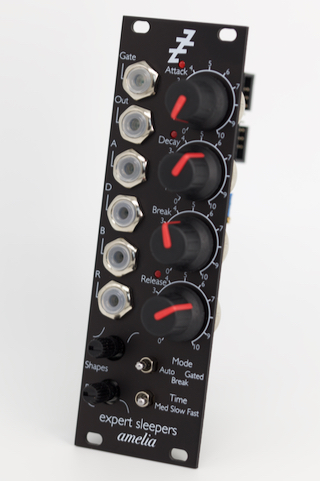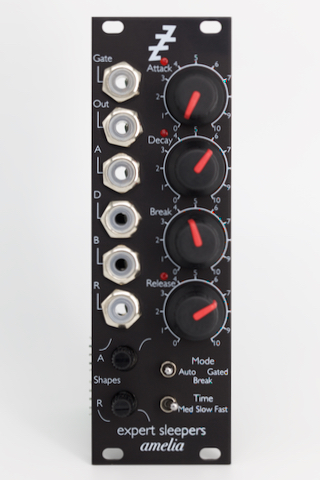Introduction
'Amelia' is an envelope/function generator with an unusual ADBR (attack/decay/break/release) configuration. CV control of all envelope times and of the break level is provided. The envelope can be set to auto-trigger, turning it into a complex voltage-controlled LFO.
The shape of the attack and decay/release sections can be independently and continuously adjusted from exponential, through linear, to logarithmic.
Amelia was developed with use with sequencers particularly in mind, where often you only have a trigger output, not a gate of adjustable length. It allows you to create complex and flexible envelope shapes from that simple trigger signal that can be fully modulated under voltage control.
The module is constructed entirely from analogue parts and discrete logic. There is no microcontroller or digital-to-analogue conversion involved and therefore no quantization of voltage levels or of the response time.
The shape of the attack and decay/release sections can be independently and continuously adjusted from exponential, through linear, to logarithmic.
Amelia was developed with use with sequencers particularly in mind, where often you only have a trigger output, not a gate of adjustable length. It allows you to create complex and flexible envelope shapes from that simple trigger signal that can be fully modulated under voltage control.
The module is constructed entirely from analogue parts and discrete logic. There is no microcontroller or digital-to-analogue conversion involved and therefore no quantization of voltage levels or of the response time.
Reviews
Sound On Sound magazine (June 2024 issue) said
It’s very well‑suited to creating Buchla‑esque, plucky but natural‑sounding responses to simple triggers, so is likely to waste no time making best friends with your sequencer.
Read the full review here.
Waveform magazine (issue 11) said
Aloysius and Amelia are good fun, very functional, flexible, and a nice change of pace. Slightly different than pretty much any other EG’s out there, they offer pinpoint control over almost every aspect of the shape, time, and length, stage of an envelope, and you can really create some unique envelope shapes and LFOs with both.
Read the full review here.
It’s very well‑suited to creating Buchla‑esque, plucky but natural‑sounding responses to simple triggers, so is likely to waste no time making best friends with your sequencer.
Read the full review here.
Waveform magazine (issue 11) said
Aloysius and Amelia are good fun, very functional, flexible, and a nice change of pace. Slightly different than pretty much any other EG’s out there, they offer pinpoint control over almost every aspect of the shape, time, and length, stage of an envelope, and you can really create some unique envelope shapes and LFOs with both.
Read the full review here.
Specifications
Amelia's specifications are as follows:
For more detail, please see the user manual.
- Panel width: 8HP
- Module depth: 42mm
- Current draw: 33mA on the +12V rail, 33mA on the -12V rail
- Inputs:
- Gate input
- CV inputs for attack, decay, breakpoint, and release
- Outputs:
- Envelope output
For more detail, please see the user manual.
Pricing & Availablity
Amelia is available now.
MSRP: UK £179 (inc VAT), US $199 (exclusive of sales tax), EU €169.50 (exclusive of VAT)
For purchasing links, please see where to buy.
MSRP: UK £179 (inc VAT), US $199 (exclusive of sales tax), EU €169.50 (exclusive of VAT)
For purchasing links, please see where to buy.


